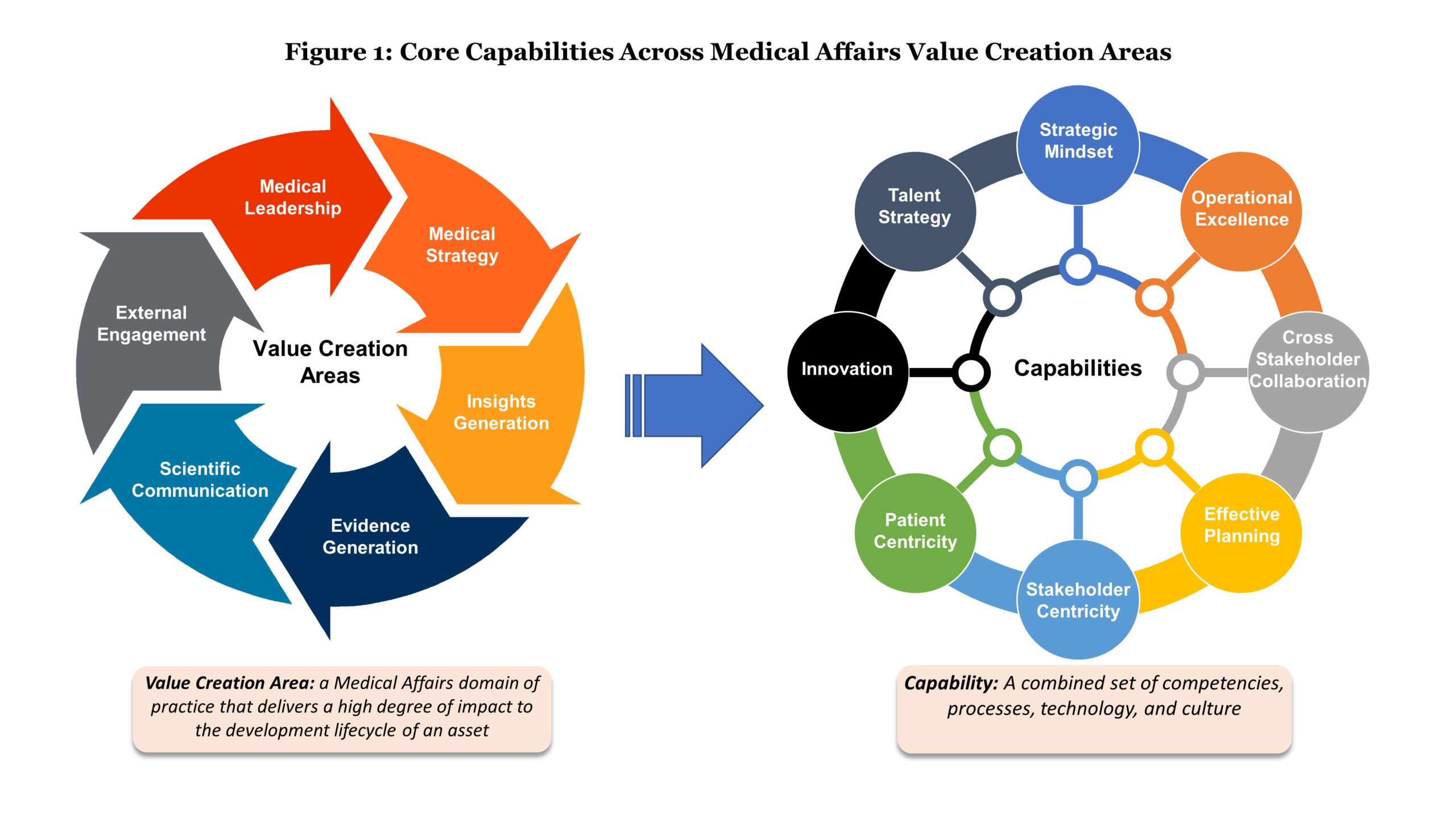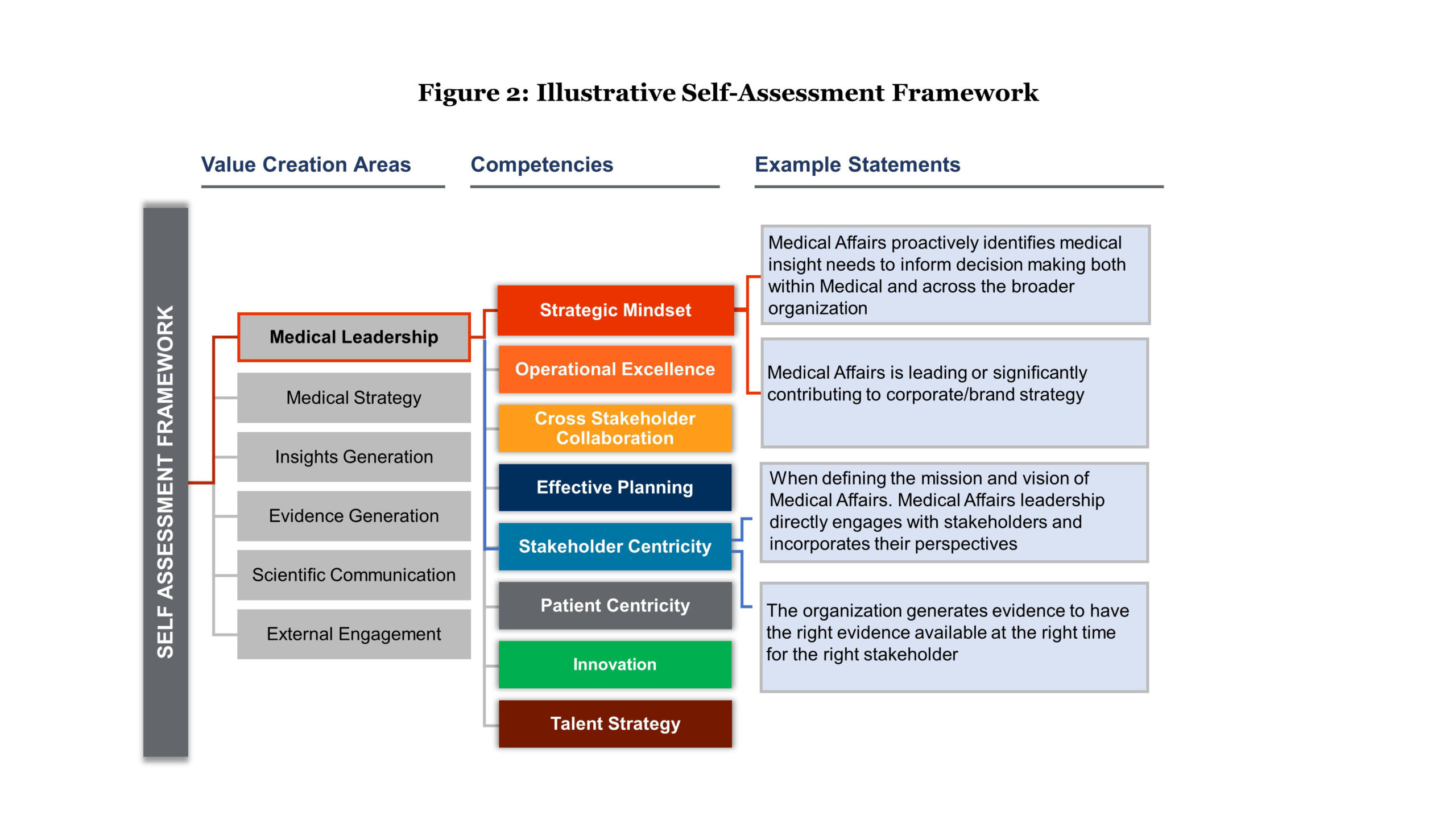As part of our series covering the future of Medical Affairs, we discussed how the function needs to adapt to the changing healthcare landscape (“Advancing Medical Affairs to be a Value-based Strategic Partner,” May 2022) and provided perspective on what that adaptation should look like (“Medical Affairs 2030: A Next Generation Operating Model,” June 2022). Now, we share insights on the core capabilities that underpin a Medical Affairs organizational strategy and how to properly assess those capabilities.
Medical Affairs Organizational Strategy
As Medical Affairs evolves to become a strategic partner to the broader organization, leadership needs to look beyond their traditional focus on delivering asset-specific strategy and develop approaches to implementing a robust organizational strategy. This will enable Medical Affairs to be structured in an effective manner with the right processes in place to maximize the positive impact the function has on the overall asset portfolio that it supports. When defining the organizational strategy, leadership needs to ensure the right capabilities are enabled to drive excellence across six core value creation areas: Medical Leadership, Medical Strategy, Insights Generation, Evidence Generation, Scientific Communication, and External Engagement (Figure 1).
 The first step is understanding what core organizational capabilities are needed to effectively plan and execute across these areas. It’s then critical to assess the current state of those capabilities—both internally in the context of the current lifecycle of the organization’s entire asset portfolio, and externally, benchmarking against the industry and emerging trends.
The first step is understanding what core organizational capabilities are needed to effectively plan and execute across these areas. It’s then critical to assess the current state of those capabilities—both internally in the context of the current lifecycle of the organization’s entire asset portfolio, and externally, benchmarking against the industry and emerging trends.
Defining Core Medical Affairs Capabilities
We believe eight core organizational capabilities are needed for Medical Affairs to be effective across its value creation areas: Strategic Mindset, Operational Excellence, Cross Stakeholder Collaboration, Effective Planning, Stakeholder Centricity, Patient Centricity, Innovation, and Talent Strategy (Figure 1).
Strategic Mindset allows for anticipating future possibilities and connecting them to decisions on strategies, tactics, and planning. This goes hand in hand with Effective Planning to ensure proper alignment of resources, processes, and tools to generate commitment and accountability during goal execution. Operational Excellence allows for effective leveraging of inputs to drive successful development and commercialization in alignment with medical strategy; such excellence depends on Cross-Stakeholder Collaboration where different sub-functions work together with broader stakeholders internally and externally to drive results and meet objectives. All depend on having a robust Talent Strategy in place to attract, develop, and retain top talent.
When delivering value, Medical Affairs needs to incorporate both Stakeholder Centricity and Patient Centricity—the former through clear understanding of stakeholder needs and value drivers with the ability to translate those insights into synergistic plans, tactics, and strategies; the latter by bringing a patient-centric mindset across the value chain, delivering meaningful medical insights internally and externally that contribute to better end-results for patients. Finally, an Innovation mindset is needed to create better ways to deliver value to stakeholders.
Assessing Core Medical Affairs Capabilities
Self-assessment tools, such as questionnaires and surveys, provide a cost-effective way of focusing an organization’s attention on needed improvements. Leaders should routinely deploy these tools within their organizations, leveraging a data-driven underlying methodology.
A targeted survey can be deployed to a wide variety of internal Medical Affairs stakeholders across one or more therapeutic areas. Participants can respond to a series of positive statements that highlight various capability components through a traditional Likert Scale approach to indicate various degrees of agreement, neutrality, or disagreement (Figure 2).
 Responses to individual statements can be analyzed using a weighted score method to display overall level of internal agreement or disagreement regarding the strength of a specific capability. When designing the statements, it’s important to ensure they accurately reflect the current lifecycle of the whole asset portfolio. It’s also key that the survey is designed for simplicity, usability, and scalability.
Responses to individual statements can be analyzed using a weighted score method to display overall level of internal agreement or disagreement regarding the strength of a specific capability. When designing the statements, it’s important to ensure they accurately reflect the current lifecycle of the whole asset portfolio. It’s also key that the survey is designed for simplicity, usability, and scalability.
Translating Assessment into Actionable Output
Assessment results can accomplish two critical objectives. First, they can highlight perceived strengths and areas of opportunity related to core capabilities, which can be accomplished by aggregating survey responses to map areas of agreement or disagreement across the assessed capabilities.
Second, they can provide useful benchmarking data to better understand where organizations stand relative to peers. Benchmarking data enables Medical Affairs teams to augment their own internal assessment to understand whether they are perceived as a leader in a specific capability, or conversely if any capability gaps that they see are unique to their situation or part of a broader industry dynamic.
Conclusion
Having access to a holistic capability assessment framework allows organizations to tailor specific strategies for evolving Medical Affairs functions based on perceived internal needs as well as where they are relative to the rest of the field. Development of self-assessment frameworks helps create awareness and motivates leaders to gain access to key capability insights to empower their organizations with an opportunity for cross-pollination of capability strengths across all Medical Affairs value creation areas.
A special thanks to Bratati Ganguly and Mikhail Safranovitch for their significant contributions to this article.










